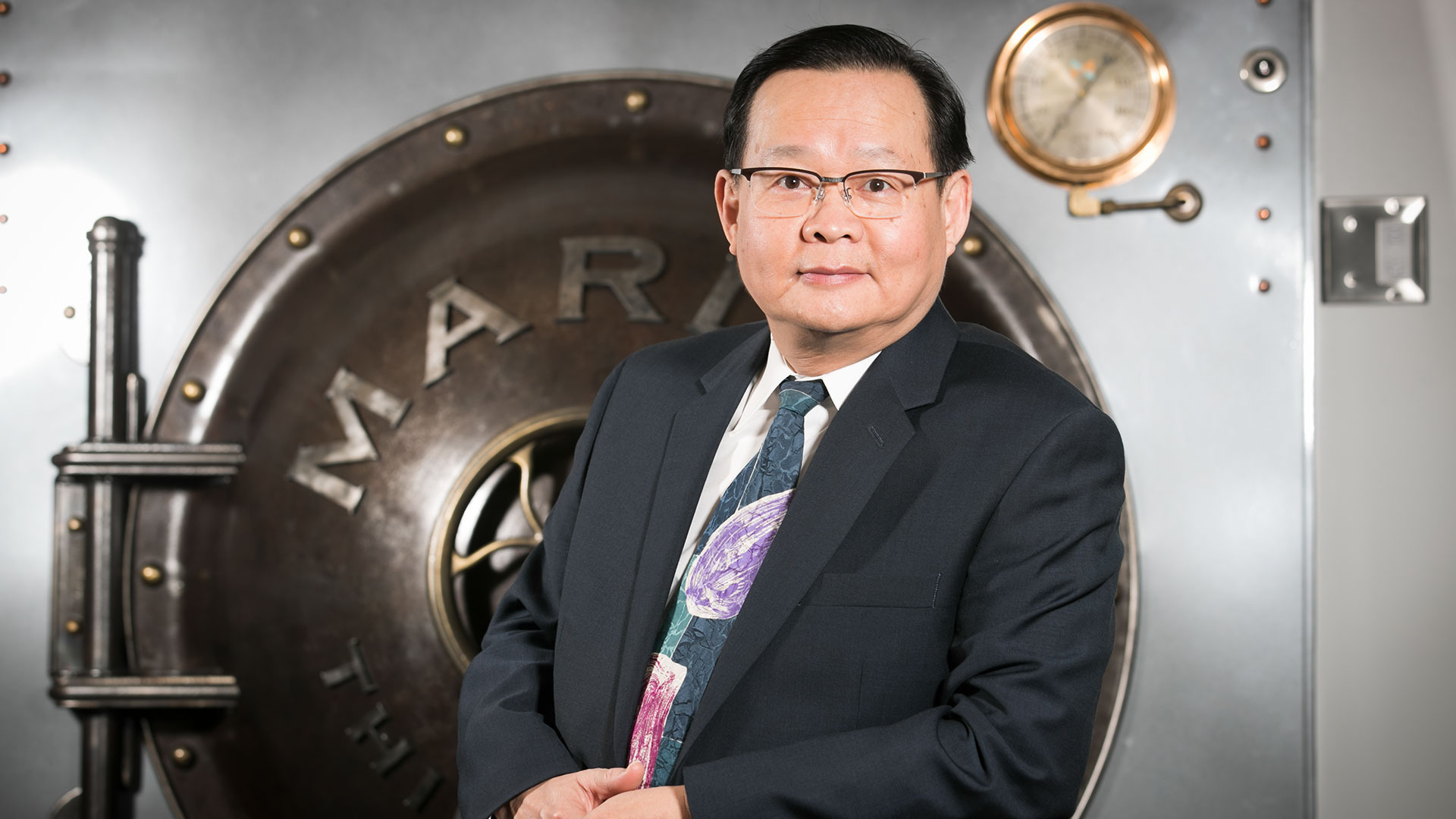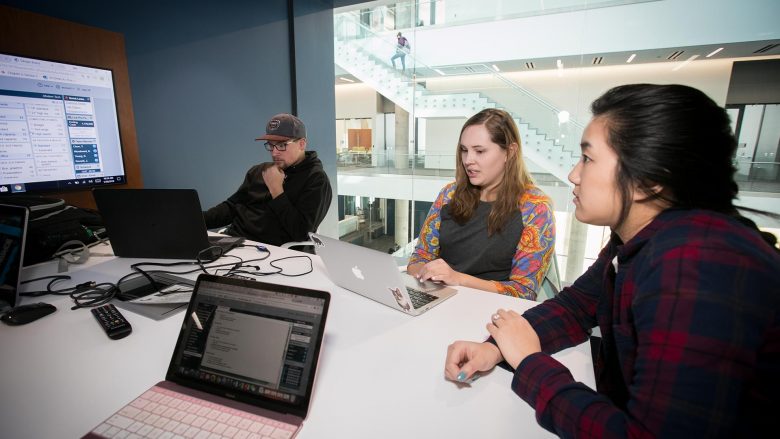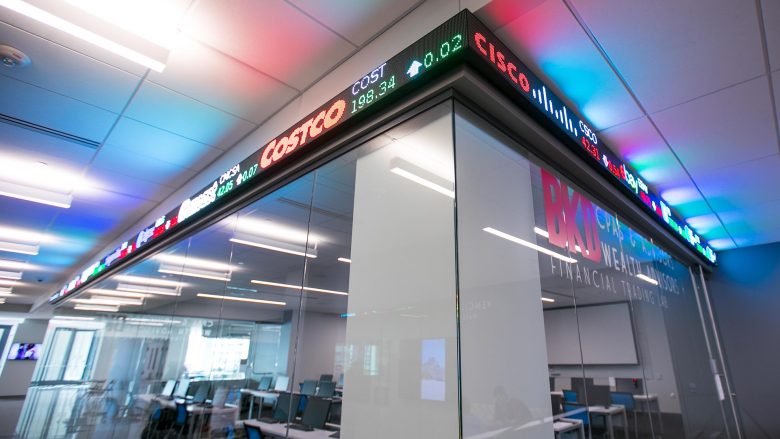
Making money do the work
“I tackle different areas, but eventually it’s all about proving some of the common sensical insights.” – Dr. Edward Chang
In his view, money may be related to each of these, whether it’s by selecting the right investments, saving money, giving generously or living comfortably into retirement.
These values inform how Chang approaches spreading financial literacy in the classroom and his research.
Chang – who has had nearly 50 publications during his career – researches investment vehicles for the everyday investor. At times, he has evaluated the soundness of Consumer Reports investment recommendations. He has also tested the reliability and risk of newer tools.
Ultimately, he wants to uncover the best ways to make money meet the goals of the investor.

Photo by Kevin White
Tools for investing
He evaluates the characteristics and performance of investment vehicles, or tools used to invest money. These tools can include anything from stock to real estate to mutual funds.
“When you use the wrong approach, it doesn’t matter how much you make,” said Chang. “You may not be able to have a comfortable retirement life.”
Chang, who has been published in the Journal of Investing, has focused his most recent research on exchange-traded funds, or ETFs. These newer investment vehicles are like mutual funds. ETFs pool together investors’ money, and give small investors what only institutional investors could do several decades ago.
“A single person can participate in the pool of money and buy 60 percent of stocks, 40 percent of bonds, for example, and invest the money,” said Chang, an early researcher on this type of investment vehicle. “It’s really a blessing for small investors because they can’t buy a lot of stock with small amounts of money, but in the pool they can.”
“When you try to predict future performance, it’s like the weather – nobody knows.” – Dr. Edward Chang
An investment research firm called Morningstar provided the initial data for his studies, which gave him fund characteristics such as the expense ratio, turnover rate, and risk and performance measures.
From there, he looked at the risk-adjusted return, which he summarizes as being the cure for naïve analysis.
“To see through the fog of risk-return tradeoff, we should focus on risk-adjusted return rather than raw return,” said Chang. “By using risk-adjusted return measures, we are able to determine how good an investment vehicle really is and whether the return is worth the risk.”
ETFs grew out of index mutual funds, noted Chang. His findings reveal that they have many advantages, such as low expense ratio, good tax efficiency, tradability like a stock and very low tracking error in terms of premium or discount.
In addition to evaluating these ETFs based on the risk-adjusted return, he notes that a low expense ratio is reliable.
But no investment vehicle is without flaws.
“When I began looking at ETFs, I got excited about them, and then many in the investing public got excited about them. They grew beautifully to the extent that I think we may have overdone it,” he said. “Many different varieties came out, small niches, kind of like a fad.”
Like fashion fads, he doesn’t expect these small niche funds to perform well in the long run.

Photo by Kevin White
Secrets of good fortune
One of Chang’s goals is to have long-term financial security and happiness – and to pay that forward through education.
According to Chang, the key is to first save your money and then invest for the future.
“I think the most important thing I’ve learned in the past 20 plus years is that saving has been underrated and investing has been overrated,” said Chang. “We always think ‘Well, I should invest in the right thing.’ But I think, more importantly, we should save first.”
“If it’s a right thing to do for the next few years, it doesn’t matter if I wait until tomorrow.” – Dr. Edward Chang
This is practical advice – something that financial practitioners and individuals could easily apply. The practicality of Chang’s research is not lost on his collaborators.
One of his frequent research co-authors, Dr. Tom Krueger, J.R. Manning Endowed Professor of Innovation in Business Education at Texas A&M University, was reading USA Today one morning and had to do a double-take.
Billionaire Warren Buffett was providing insight on financial decisions.
“Mr. Buffet’s advice was so consistent with Dr. Chang’s findings…it was almost as if I were reading advice from Dr. Chang,” said Krueger.
Ultimately, Chang believes that investing should be boring, not dramatic.
For those who wish to dabble in higher risk investments for the potential higher pay-off, he has this advice: “We’re talking about your ability to live comfortably throughout life,” so those risky investments should be limited to 5 to 10 percent of the total investment. “You don’t want to play with fire.”
- Story by Shay Stowell
- Main photo by Kevin White


I totally agree with the point :”more importantly, we should save first.” After all, investment without the basic foundation of finance is impractical.
Dr chang,I totally agree with your points,I have a question about your acticle, you said:“I think the most important thing I’ve learned in the past 20 plus years is that saving has been underrated and investing has been overrated,” Do you mean the U.S. market, or Chinese market, or the global market?